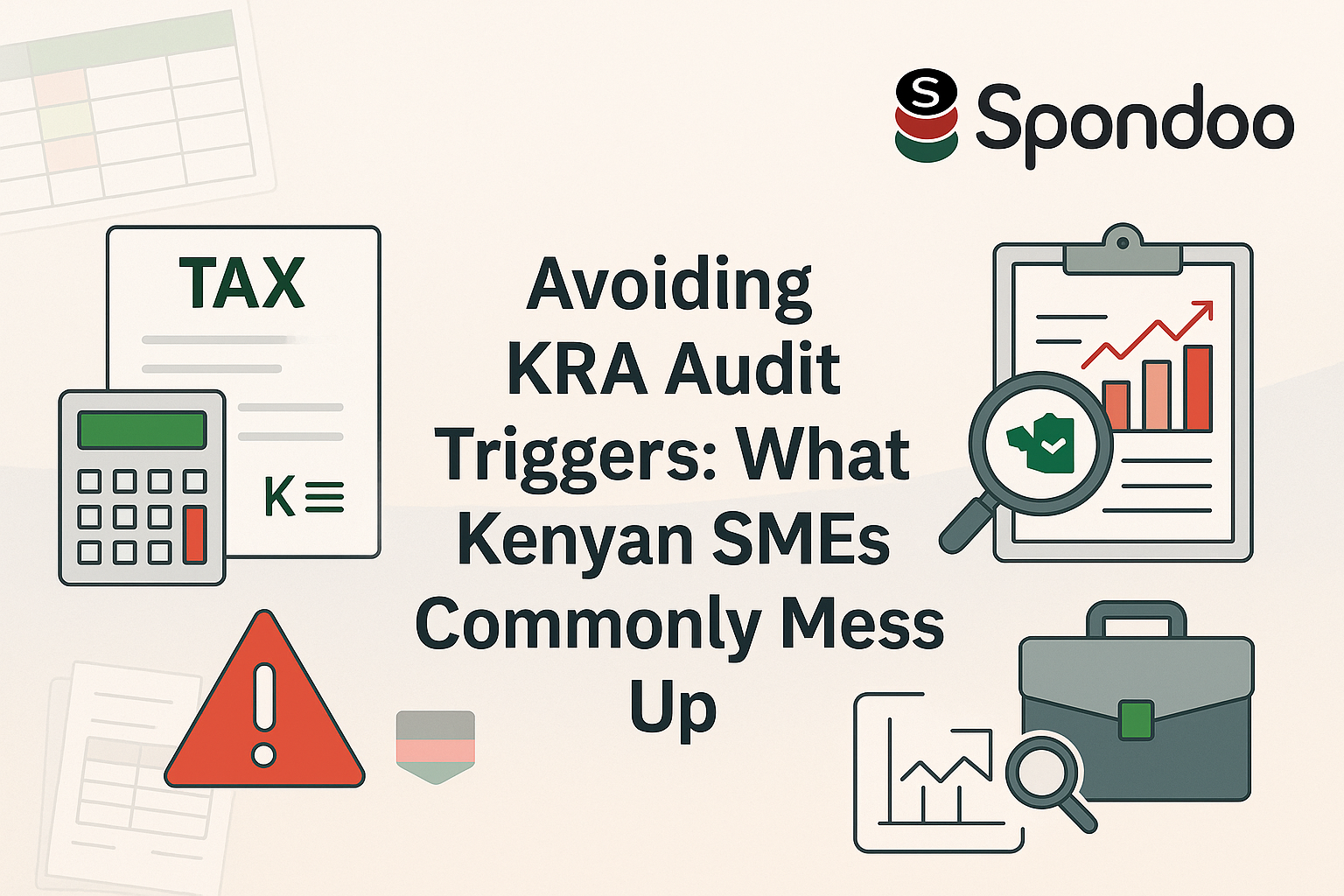
When you run a Kenyan SME, a spotlight moment comes when the KRA calls — even if you think your books are fine. The truth is, audits are increasingly common and even seemingly small mistakes can turn into major red flags. In this article, we’ll walk you through what triggers a KRA audit, the compliance mistakes Kenyan SMEs keep repeating, and the latest regulatory changes you must know to keep your business safe and audit-ready.
Over recent years, the KRA has ramped up its enforcement efforts. Through its digital platforms like iTax and eTIMS, plus data-sharing with banks and other government agencies, the authority can detect discrepancies, mismatches and non-compliance much faster than before.
For example, smaller businesses that once flew under the radar are now at risk because the threshold for attention has dropped.
If you’re unprepared, an audit can mean penalties, reputation damage, time lost, and unexpected tax assessments. So it’s not just about paying tax — it’s about protecting your business operations, cash flow, and peace of mind.
Here are some of the most common audit triggers that Kenyan SMEs should watch out for:
When your VAT returns, income tax returns, payroll filings, and bank transactions don’t align — that raises KRA’s radar. For example, if your sales per iTax differ materially from bank deposits or from what suppliers report, you’re at risk.
Claiming company losses year after year can prompt questions about your business model. Similarly, requesting large VAT refunds or repeatedly amending tax returns signals possible issues to KRA. Bowman's Law+1
The move to mandatory e-invoicing via eTIMS has put additional pressure on businesses. If you issue invoices that aren’t eTIMS-compliant, or you can’t produce supporting source documentation for expenses or sales, you’re exposed.
Major asset sales, mergers, significant changes in supplier or customer profiles, or large payments can trigger deeper review. These show up as “unusual” from an audit perspective.
The KRA doesn’t rely only on your filings — it cross-checks with supplier reports, bank data, cellphone money flows, and even tips from insiders. Being unaware of this puts you at risk.
To stay ahead, your business must also be aware of recent legislative and regulatory shifts:
The Finance Act 2025 introduced key updates expanding related-party transaction rules, strengthening transfer pricing regime, and tightening input VAT recovery deadlines to 12 months.
The KRA has signaled a renewed push for full eTIMS coverage of all businesses — earlier exemptions for smaller firms may be revisited.
Data tracking and digital audit tools are now fully embedded; manual bookkeeping gaps and missing digital trails are likely to lead to audit flags.
Here are real-world errors we see SMEs make — and what to do instead:
Fix: Be consistent. Even if your business has low or no activity, file timely returns. Non-filing is a major red-flag.
Fix: Match every expense to a source document (invoice, receipt, bank statement). Maintain an “audit-trail” linking each transaction to proof.
Fix: Regularly reconcile your accounting records with supplier and customer statements and bank data. Address variances proactively.
Fix: Ensure every sales invoice you issue is eTIMS-compliant, and that any expense invoice you use for deduction is valid and can be produced if required.
Fix: Stay up to date. A backlog of statutory filings or remittances is an easy audit trigger.
Let’s move beyond “what not to do” and focus on what you should do now to prepare:
Set up a strong internal control framework: Define clearly who is responsible for invoicing, who approves expenses, who reconciles bank accounts. Segregation of duties reduces risk.
Maintain an audit trail: Use accounting software, document attachments, date/time/user stamps. A complete chain of documentation reduces your exposure in an audit.
Regular reconciliation: Monthly or quarterly, match your ledgers to bank statements, customer/supplier statements, and ensure figures align with iTax returns.
Stay current on KRA changes: Subscribe to updates, engage your tax advisor, and ensure you implement new rules (e.g., eTIMS, transfer pricing) before you’re forced to.
Train staff and outsource where necessary: Compliance is not just the finance person’s job. Your team should understand record-keeping, invoicing, and statutory obligations.
Respond swiftly to KRA notices: If you receive a “Notice of Intention to Audit”, treat it seriously. Gather documentation promptly, get advice, and engage proactively.
For Kenyan SMEs, avoiding a KRA audit is not about luck — it’s about preparation, consistency and transparency. Audit triggers are everywhere: mismatched data, poor documentation, non-compliant invoicing, and silent asset movements all invite scrutiny. But by aligning your records, staying up to date with KRA’s digital compliance tools, and embedding strong internal controls, you shift from being reactive to being audit-ready. That’s not just risk management — it’s peace of mind.
on’t wait for a KRA audit letter to find out what’s wrong with your books — get proactive now.
👉 Visit spondoo.ke today and book your free tax health consultation with our professional accountants and business advisory experts at Spondoo Kenya. We’ll help you identify hidden audit risks, fix iTax and eTIMS mismatches, and keep your business fully KRA-compliant — saving you time, penalties, and unnecessary stress.
Act today — let’s help you safeguard your business, strengthen your compliance, and focus on what really matters: growth and profitability.
